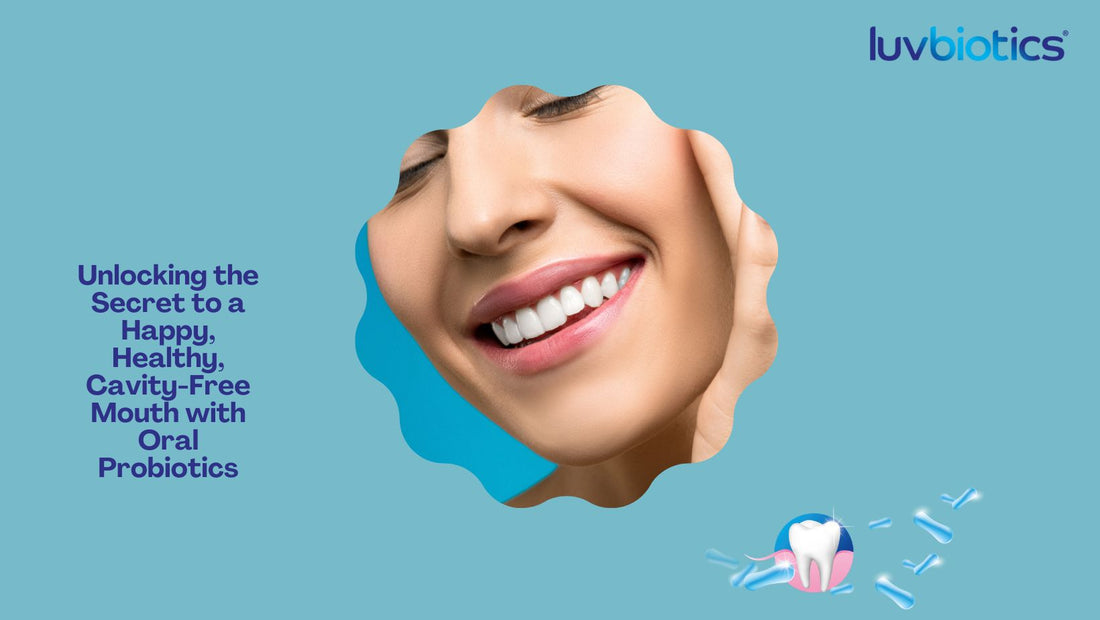Maintaining good oral health is crucial for our overall well-being. While brushing and flossing are essential for oral hygiene, recent research has shed light on an exciting area of oral care: oral probiotics. These beneficial bacteria, such as Lactobacillus reuteri and Lactobacillus paracasei, can play a significant role in promoting a happy, healthy, and cavity-free mouth. In this blog post, we will explore the benefits of oral probiotics and their potential to revolutionize dental care.
What Are Oral Probiotics? Probiotics are live microorganisms that, when consumed in adequate amounts, confer health benefits on the host. While we often associate probiotics with digestive health, their positive impact on oral health is becoming increasingly recognized. Oral probiotics are specifically formulated to target the oral cavity, delivering beneficial bacteria directly to the areas that need them the most.
Lactobacillus reuteri: A Guardian of oral health: Lactobacillus reuteri is a strain of probiotic bacteria that has shown remarkable potential in promoting oral health. Research suggests that L. reuteri can inhibit the growth of harmful bacteria in the mouth, such as Streptococcus mutans, which is a major contributor to tooth decay and cavities. Studies have found that regular use of L. reuteri as an oral probiotic can reduce the levels of S. mutans and decrease the risk of developing dental caries (tooth decay) (1). Additionally, L. reuteri has been shown to promote the production of antimicrobial compounds, strengthen the tooth enamel, and support gum health (2).
Lactobacillus paracasei: Strengthening oral defence: Another powerful probiotic strain for oral health is Lactobacillus paracasei. It has been found to have a positive impact on dental health by enhancing the body's natural defense mechanisms. L. paracasei can help regulate the immune response in the oral cavity, reducing inflammation and promoting healing (3). Additionally, studies have shown that L. paracasei can inhibit the growth of pathogenic bacteria, reduce bad breath, and improve overall oral hygiene (4).
The beneficial effects of L. reuteri and L. paracasei can be attributed mainly due to their ability to compete with harmful bacteria for resources and attachment sites in the mouth. By occupying these sites, the probiotic bacteria limit the growth and colonization of pathogenic organisms. Moreover, these oral probiotics can produce antimicrobial substances that directly inhibit the growth of harmful bacteria (5). By rebalancing the oral microbiota and promoting a healthier microbial environment, oral probiotics can contribute to a cavity-free mouth and improved oral well-being.
Incorporating oral probiotics into your daily oral care routine is a simple and effective way to support a healthy mouth. Probiotic lozenges, gums, toothpaste, or mouthwashes containing oral probiotics are readily available and easy to use. These products deliver a concentrated dose of beneficial bacteria directly to your oral cavity, ensuring their optimal colonization and benefits.
It's important to note that oral probiotics should not replace conventional oral hygiene practices. Regular brushing, flossing, and dental check-ups remain essential for maintaining oral health. Oral probiotics should be viewed as a complementary approach, enhancing the effectiveness of traditional oral care practices.
Oral probiotics, particularly Lactobacillus reuteri and Lactobacillus paracasei, offer a promising avenue for promoting a happy, healthy, cavity-free mouth. These beneficial bacteria work to rebalance the oral microbiota, inhibit the growth of harmful bacteria, and strengthen the body's natural defence mechanisms. By incorporating oral probiotics into your daily oral care routine, alongside traditional oral hygiene practices, you can take an active step towards achieving optimal oral health.
References:
- Cagetti MG, et al. (2013). Effect of three-month daily consumption of the probiotic Lactobacillus reuteri DSM 17938 on tooth decay in preschool children. Clinical Oral Investigations, 17(9), 2339-2342.
- Kang MS, et al. (2011). Inhibitory effect of Weissella cibaria isolates on the production of volatile sulphur compounds. Journal of Clinical Periodontology, 38(5), 444-449.
- Ahola AJ, et al. (2002). Effect of Lactobacillus rhamnosus Strain GG Administered with a Precursor of Colonization on the Oral Microbiota of Healthy Volunteers. Journal of Clinical Periodontology, 29(10), 1018-1023.
- Bao X, et al. (2018). Antimicrobial effect of Lactobacillus paracasei L10 against oral pathogens. BMC Microbiology, 18(1), 213.
- Tenovuo J, et al. (2012). Modulation of oral bacterial ecology by antimicrobial therapy. European Journal of Clinical Microbiology & Infectious Diseases, 31(10), 2627-2632.

